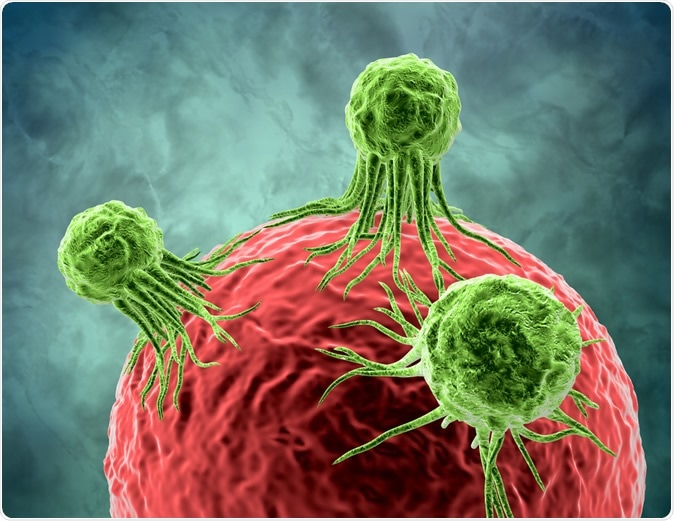A recent large German study has shown that a new combination therapy for breast cancer treatment leads to a lowered risk of the disease coming back. A commentary on this landmark clinical trial has been published in the latest issue of the Journal of Clinical Oncology by the researchers Masey Ross and Charles Geyer Jr. from the VCU Massey Cancer Center. The commentary was titled, “Nab-Paclitaxel: A New Standard of Care in Neoadjuvant Therapy of High-Risk Early Breast Cancer?”

Tumor cancer cells attacking and growing on human cell 3d rendering. Illustration Credit: Illustration Forest / Shutterstock
The modified drug combination was found to be useful in women with a high risk, HER-2 negative breast cancer, the researchers wrote. They explain that this group of breast cancer patients are an important subset of breast cancer patients and this makes the study so important. Ross is a medical director of the Integrative Health Program and breast medical oncologist at Massey and assistant professor of internal medicine at the VCU School of Medicine while Geyer is an associate director for clinical research, Harrigan, Haw, Luck Families Chair in Cancer Research, breast medical oncologist and also a member of the Developmental Therapeutics research program at Massey and a professor of internal medicine at the VCU School of Medicine.
The team explains that at present the standard treatment for breast cancer patients with high risk lymph node negative or positive is neoadjuvant chemotherapy that is given before the surgery. The standard drug used in this situation is Paclitaxel which leads to hypersensitivity or allergic reactions and damage to the nerves. The researchers also said that nerve damage caused by paclitaxel is often severe for these HER-2 positive breast cancer patients and prevents them from being administered these agents.
This new study by the German Breast Group (GBG) in 2016 used albumin-based drug nab-paclitaxel (Abraxane) as an alternative of standard Paclitaxel before surgery. Nab paclitaxel stands for “Nanoparticle albumin-bound paclitaxel”. Nab-Paclitaxel has been approved for use in advanced metastatic breast cancer since 2005. In the early trials three weekly of therapy with nab-paclitaxel (260 mg/m2 as a 30-minute infusion) was compared with standard paclitaxel at “175 mg/m2 as a 3-hour infusion.” Results had shown that overall response was better with nab-paclitaxel (33 percent compared to 19 percent with standard paclitaxel). Similarly median time taken for the tumour to progress was 16.9 weeks for standard paclitaxel and 23 weeks for nab-paclitaxel. Phase 3 trials of nab-paclitaxel show that there is a 10 percent risk of neuropathy compared to a 2 percent risk with standard paclitaxel.
They noted that at the time of surgery Abraxane led to pathological response (removal of traces of cancer from the breast as well as an adjoining lymph nodes) in the cancer in patients with triple negative breast cancer. Other disease subtypes did not fare as well, the researchers wrote.
The GBG results revealed that patients were divided into two groups – one received nab-paclitaxel, while the other received paclitaxel before surgery. The former group was found to have better long term outcomes such as longer disease free survival and overall survival compared to the latter group. The efficacy was seen in women with triple negative, hormone receptor positive and HER-2 positive breast cancers. In some regimens Carboplatin is also used alongside as a neoadjuvant therapy in those who do not show good pathological response with initial paclitaxel therapy. write the authors of the commentary. This study from the GBG however did not use carboplatin in any of their patients. Ross said, “We suggest that physicians who do not incorporate carboplatin into treatment for women with triple negative breast cancer should consider nab-paclitaxel over standard paclitaxel.”
The authors of the commentary explain that there have been two phase 3 randomized trials that compared nab-paclitaxel with s-paclitaxel (standard paclitaxel). They wrote that in the first study - the GeparSepto trial (GBG 69) trial the researchers had included 1,229 women with high-risk primary breast cancer who had been administered “four cycles of either nab-paclitaxel or s-paclitaxel on days 1, 8, and 15 every 21 days followed by epirubicin and cyclophosphamide for four cycles.” Results showed that although risk of neuropathy was greater with nab-paclitaxel, the pathologic complete response (pCR) was 38.4 percent with nab paclitaxel compared to 29 percent with s-paclitaxel. Pathological response rates were higher for women with HER2-positive tumors.
In the second study - the ETNA (Evaluating Treatment with Neoadjuvant Abraxane) trial, a total of 695 women were administered “four cycles of nab-paclitaxel 125 mg/m2 or s-paclitaxel 90 mg/m2 on days 1, 8, and 15 every 28 days followed by an anthracycline regimen of the physicians’ choice.” Among women with triple negative breast cancer the percentage of pathological response was same with both forms of paclitaxel.
Ross, in a statement said, “The study is interesting because it makes us rethink whether drugs administered prior to surgery that do not improve chances of having a complete response should be discarded under the assumption that they will not decrease a patient's risk of recurrence after surgery.” Both Geyer and Ross explained that the study showed that this therapy could benefit breast cancers of this subtype.
Geyer said, “In our opinion, this information is most applicable in women with hormone receptor positive, HER-2 negative breast cancer. We feel it may not be particularly relevant for patients with HER-2 positive breast cancer because substantial improvements in HER-2 directed therapies co-administered with chemotherapy in this subset have occurred since the German study finished accruing patients. The improvements seen with nab-paclitaxel came at a cost of increased rates of neuropathy, and alternative approaches available for patients with HER-2 positive breast cancer are associated with less neuropathy.”
Source:
Journal reference:
Nab-Paclitaxel: A New Standard of Care in Neoadjuvant Therapy of High-Risk Early Breast Cancer? Masey Ross and Charles E. Geyer Jr Journal of Clinical Oncology, https://ascopubs.org/doi/10.1200/JCO.19.00877